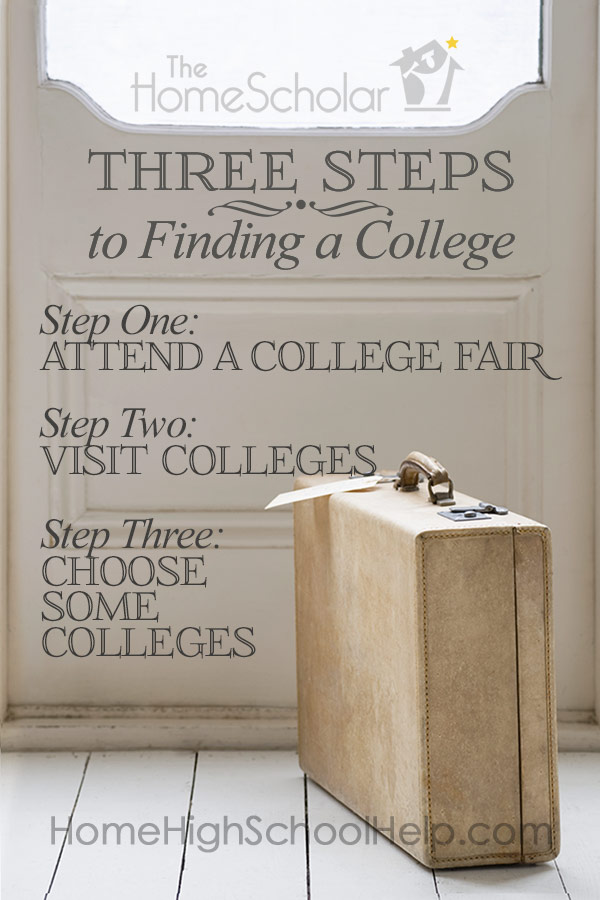
Three Steps To Finding A College
There are three steps you need to take to choose a college that’s a good fit. Each step requires an investment of your time, money, and coordination. First, find a college you would like to visit, by attending a college fair. Second, make an official visit at the colleges where you might be interested. Third, use the information you have collected to choose at least a handful of appropriate colleges. Let me explain how it works.
Quick Links

Step One: Attend A College Fair
Fall Fairs
Debbie was at her lowest point when she realized her 12-year-old son, Dan, could not read or write in his Sunday school classes. She had to carefully shield him from the judgment of others. Her homeschool friends were very understanding, but she worked hard to keep him away from situations where he would have to read aloud. She was distraught. Again and again they changed curriculum, hoping each time that a new curriculum would change everything. It seemed like nothing would ever work. He struggled with learning all the way through high school. She never had him officially tested, because she didn't want him to be labeled as an adult. Dan has achieved wonderful things since graduating homeschool!
Efficient Evaluation
Attending a college fair is the most effective and efficient way to come up with a list of potential colleges to consider. Instead of traveling all over the country to visit different schools, they all come to you! You’ll find all sorts of colleges in one convenient location. If you’re looking for that ‘perfect fit’ college for your high school student, look no further than your closest college fair to begin your search. Even for those who live a little too far away from a big city to make a day trip possible, it’s worth the investment to travel to your closest city to attend a fair, even if it takes a day or two. The opportunity to find out about so many schools in one location is really worth the investment of time and money.
Finding a Fair
Homeschoolers who live close to a large city should have an easy time finding a college fair nearby. If you search online for ‘college fair’ and the name of your city, you will probably find several options. In addition, there are larger fairs put on by private organizations each year. The biggest are the National Association for College Admission Counseling (www.nacacnet.org), and the North American Coalition for Christian Admissions Professionals (www.naccap.org). There are also specialized groups that have fairs. Exploring College Options Consortium represents Ivy League schools (www.exploringcollegeoptions.org), Colleges That Change Lives (www.ctcl.org), Historically Black Colleges and Universities (https://hbcuconnect.com/colleges/) and Performing and Visual Arts fairs.
Booths and Workshops
College fairs are a lot like your typical homeschool convention. The company comes to you! You’ll see lots of booths, workshops, people, noise, and hard concrete floors. However, instead of homeschool curriculum, the product being sold is a college education. In addition to colleges, you will find other companies and organizations affiliated with college admission and scholarships, such as The Princeton Review, the College Board®, and others like them. Stop by their booths and pick up their free samples! Take classes on different topics related to college admission and scholarships. These might include seminars on SAT preparation, financial aid, college life, admissions, etc. These are worth attending, as the more you know about these topics, the better prepared you will be to help your student succeed.
Efficient Evaluation
Attending a college fair is the most effective and efficient way to come up with a list of potential colleges to consider. Instead of traveling all over the country to visit different schools, they all come to you! You’ll find all sorts of colleges in one convenient location. If you’re looking for that ‘perfect fit’ college for your high school student, look no further than your closest college fair to begin your search. Even for those who live a little too far away from a big city to make a day trip possible, it’s worth the investment to travel to your closest city to attend a fair, even if it takes a day or two. The opportunity to find out about so many schools in one location is really worth the investment of time and money.
Students First
College fairs are for both students and parents. Students need to ask questions and explore possibilities; they need to introduce themselves to representatives of schools, and find out whether a school has what they think they need—whether that’s a swimming pool, a French major, or pizza in the cafeteria. Encourage your student to be conversational and friendly in their interactions, and to dress neatly and cleanly for the day. Parents have important questions too! What is the college’s homeschool policy? Do they accept CLEP or AP® credits? Do they offer whopping big financial aid?! What are the average SAT/ACT® test scores for this school? These questions will help you determine whether a school will be a good fit for your student.
Parents Second
Financial aid is a topic on many parents' minds as they wander through the aisles of a college fair. Fortunately, a college fair is a great place to find a school that will offer your child assistance. Most schools are up front about what they’re looking for in an applicant; find one that’s looking for what your student has, and you may find some pretty attractive financial aid. And it’s not always academic accomplishment they’re looking for. At one college fair I attended, I overhead a school representative say they were looking for a student from Nebraska, so they could say they had a representative from every state in the union. You can imagine what good scholarship money they were offering to any Nebraskan applicant! Another school I know of offered a great scholarship to an applicant who was an accomplished pianist, because their choir really needed an accompanist. If you find a few schools you’re interested in at the fair, be sure to ask them what they’re looking for from their applicants, and see whether your student just might fit the bill.
Online Option
If you simply can’t make it to a college fair, don’t despair; there are a few other options. The College Board® (www.collegeboard.com) has a very user-friendly college search program, and other resources like Fastweb and US News and World Report can help you find colleges that match your student’s interests and abilities. If your child will take the PSAT/NMSQT® soon, have them check the college search box to receive college information, and colleges who are interested in your student will send you admission information. Even though online searches are very helpful, they can’t replace attending a college fair. Typically dozens, and sometimes hundreds of schools are represented at a fair, and nothing beats a face-to-face encounter with a representative who is familiar with their school. In addition to attending a fair, educate yourself as much as possible about the college admission and scholarship process, so that you will be prepared when the time comes.

Step Two: Visit Colleges
Visiting a college is the final, critical step in choosing where your child will attend. You can’t really tell the personality of a college from their brochures, or professionals at a college fair. Even if a school has the word “Christian” in their name and has a Christian representative at a fair, that doesn’t mean they share your family’s values. Names mean nothing. A quick Google search for “Texas Christian University Top 10 Party Schools” explains why the college visit is crucial. College visits are a crucial ingredient to successfully launching your child. Four years is a long time! They could live at college for four years of their life, so visiting is a crucial step in the process of choosing. These tips will help you make the most of your time.
Official Visit
No matter whether you will be visiting on a day when hundreds of other potential students are visiting, or just touring on your own, make sure the admissions department knows you’re coming. They pay attention when students show interest in them, and you want them to know you’re interested. Most college websites give you the opportunity to register for a visit, so don’t miss the opportunity to let them know you’re coming.
Meet the Staff
Since it’s important to find a college who will love you just as much as you love them, make sure your student dresses neatly and is at their most charming during the visit. When you meet with representatives, resist the urge to jump in and run the show; back off and let your student do most of the interacting. That way, the college will get to know your child better, and get a better picture of who they are, beyond their application. Of course, it’s entirely appropriate for parents to ask questions about homeschool records, etc., but let your child do most of the talking at this point.
Take a Tour
Don’t miss the chance to attend a class or two that interests your child. This will help them get a better idea of what day-to-day classes will be like. Also try to meet with a department head if your child has some idea of what they’d like to major in. Tours are usually offered too, so go check out the campus. Don’t forget to take notes, so that when your student writes their application essays, they can include details about their visit.
Go with Your Gut
Pay close attention when you visit, using all your senses. What is the Holy Spirit saying? Is it a whisper, or a shout? What is your initial gut instinct? Is this a positive environment? Can you see your child living here for four years?
Look Closely
Pay attention to what you see on campus. Are the students happy? Is this a pleasant place to be? What do the grounds look like? If the place is worn and littered, it might indicate that students don’t take much pride in their school. Also ask specific questions about what happens on campus, such as special events, resources, etc. Just like at many institutions, this kind of information is often posted on the walls of the bathrooms, so make sure to check that out! Do the activities seem fun? Are they consistent with your values? I remember one college my husband and I visited that had so many fun activities, we wished we could attend!
Listen Carefully
In addition to looking, make sure to listen too. What are the student and faculty conversations like? Are people respectful? Is their conversation laced with profanity? Listening to professors can tell you a lot about a school, too: do they know their students by name? Talk to them as adults? Do they seem like good role models for your child?
Taste the Food
Most colleges will provide prospective families with a free voucher to use in the campus dining hall. Eating the food during a visit is a MUST! Your child will be eating here for at least several years, three times a day, seven days a week! And if your child has any kind of food allergies, the college must be able to accommodate them.
Clean Environment
Lastly, pay attention to whether the school is clean. It doesn’t have to be spotless, but is it consistent with your family standards? More importantly, how does the environment make you feel about safety and security? Is this a place your child will enjoy and feel comfortable living in?
Overnight Visits
Once you have narrowed your search to just a few colleges, have your child spend a night on campus, and experience life in the dorms. This is their opportunity to get to know the student population a little better, and if they live on campus, a huge proportion of their time will be spent in the dorms. Most schools offer this opportunity, and it’s another chance to demonstrate to them how serious you are about their school!
Thank You Note
After a college visit, it’s important to send thank you notes to the admissions staff and any professors you spent time with. Both parents and students can do this, and both email and snail mail are appropriate. If you are really interested in a college, I recommend sending both.

Step Three: Choose Some Colleges
Now that you have visited colleges, you might have a much better idea which colleges will be a good fit for your child. Applying to reach, fit, and safety colleges can help prevent heartache. When you apply to a variety of schools, you’re almost sure to find a perfect fit that will accept you, and may provide great scholarships. It’s common for children to apply to 4-12 colleges, with a mix of reach, fit, and safety schools. Using the information you have obtained, choose at least four colleges where your child can apply. You want them to apply to this many schools, so you can ensure some success with admission and scholarships.

The HomeScholar's Guide to College Admission and Scholarships
My book, The HomeScholar’s Guide to College Admission and Scholarships is a great place to start learning about this process. It’s available in paperback and on Kindle, and covers all the topics necessary for college success, including how to search for colleges and interpret college statistics, how to visit the colleges and evaluate what you discover, and how to receive merit-based scholarships and market students effectively to the colleges of their choice.






